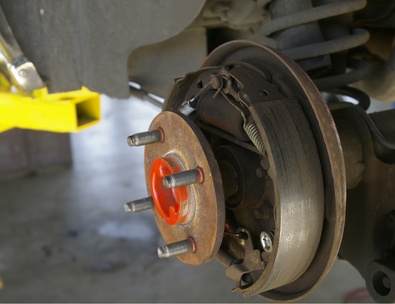
Brake repair can be an expensive and costly car repair if you wait too long. Paying attention to some of the signs can save you time and money. If you let the brakes go too long without repair, you can cause extensve damage. Brakes that are worn down too low may also not be able to stop your vehicle, resulting in injury to you or someone else. Listen to your vehicle. Pay attention to the smells, noises, and visual indicators that alert you that something is wrong. These signs will let you know when the rear brakes need replacement.
Listen to the sounds of your brakes. The most obvious indicator your rear brakes need replacing is the squeaking that you hear when you press down on the brakes. This noise usually indicates that the brake pads have worn down. At this stage the repairs are not too expensive. If you wait too long, you may need to have the rotor or the drums replaced. The metal housing on the pads makes contact with the metal drums causing metal to metal friction and resulting in major brake repair. (See Resource 1)
Respond to the service light in your car. Some cars with disc brake pads have sensors that trigger the service light on your dash board (see reference 2). When your service light comes on in your vehicle it is a warning that your car needs to be serviced as soon as possible. The service light is very sensitive so the problem will be caught early. You will need to respond to the light and have your rear brakes checked. Once the brakes are repaired the light should go out. If the light remains on you may have other car service issues.
Check your brake fluid. If you press down on your brakes and they feel unresponsive, your brake fluid level may be low. Adding brake fluid will often solve the problem. If a large amount of fluid had to be replaced there is a good chance you have a leak in one of your front or rear brake lines. Have your vehicle checked for an oil leak.
Press down on your brake pedal for resistance. According to Cars Direct, "If the master cylinder goes bad, when you press down on the brake pedal, it might go to the floor and take longer to stop the car." The master cylinder is where the brake fluid is stored and sent to each cylinder. The brake fluid is what applies force to the front brakes, rear brakes, and drums. A bad master cylinder would interrupt the fluid's flow into the cylinders causing you to lose brake resistance.